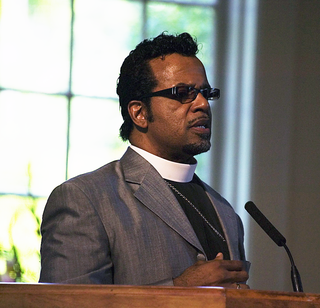A Quote by Lesslie Newbigin
This withdrawal of theology from the world of secular affairs is made more complete by the work of biblical scholars whose endlessly fascinating exercises have made it appear to the lay Christian that no one untrained in their methods can really understand anything the Bible says. We are in a situation analogous to one about which the great Reformers complained. The Bible has been taken out of the hands of the layperson; it has now become the professional property not of the priesthood but of the scholars.
Quote Topics
Related Quotes
It's important for people in the Church to realize that the way they talk and think about the Bible isn't the way Bible scholars talk and think about it - and I'm including "Bible-believing" scholars there. There is a wide gap between the work of biblical scholars, whose business it is to read the text of the Bible in its own worldview context, and what you hear in church.
"Biblical theology" refers to something more precise than theology that is faithful to the Bible. It might be helpful to draw a contrast: at the risk of oversimplification, systematic theology tends to organize theology topically and with an eye cast on its contemporary relevance, while biblical theology tends to organize the same biblical material so that it is easier to see the distinctive contribution of each biblical book and human author, and to trace the trajectories of themes across the Bible so we see how the books of the Bible hold together.
A Christian is not a person who believes in his head the teachings of the Bible. Satan believes in his head the teachings of the Bible! A Christian is a person who has died with Christ, whose stiff neck has been broken, whose brazen forehead has been shattered, whose stony heart has been crushed, whose pride has been slain, and whose life is now mastered by Jesus Christ.
We, including many Christians, read the Bible through "eyes" conditioned by, and even accommodated to, modern Western culture plus the influences of messages and ideas from other cultures that are alien to the worldview of the biblical writers. Therefore, in order fully to understand the Bible and allow the Bible to absorb the world (rather than the world - culture - absorb the Bible) we must practice an "archaeology" of the biblical writers' implicit, assumed view of reality.
My claim is simply that the literary approach is one necessary way to read and interpret the Bible, an approach that has been unjustifiably neglected. Despite that neglect, the literary approach builds at every turn on what biblical scholars have done to recover the original, intended meaning of the biblical text.
Today there survives more than 25,0000 partial and complete, ancient handwritten manuscript copies of the New Testament. These hand written manuscripts have allowed scholars and textual critics to go back and verify that the Bible we have in our possession today is the same Bible that the early church possessed 2,000 years ago.
We are sometimes told that we are not a biblical church. We are a biblical church. This wonderful testament of the Old World, this great and good Holy Bible is one of our standard works. We teach from it. We bear testimony of it. We read from it. It strengthens our testimony. And we add to that this great second witness, the Book of Mormon, the testament of the New World, for as the Bible says, "In the mouth of two or three witnesses shall [all things] be established" (2 Cor. 13:1).
In case any are puzzled by the different translations from which I draw strength and help and delight, it is like this: In studying any object with the microscope we use different lenses and turn the mirror in various ways; each change brings out some new wonder and beauty. So it is for those who are not Greek or Hebrew scholars, and who use the work of scholars to open the meaning of the exhaustible Word-the Bible is richer than any single version can fully show.
It is fashionable in some academic circles to exercise scholarly criticism of the Bible. In so doing, scholars place themselves above the Bible and seek to correct it. If indeed the Bible is the Word of God, nothing could be more arrogant. It is God who corrects us; we don’t correct Him. We do not stand over God but under Him.
I don't want to give the impression that I'm a great Bible reader. I don't sit down every day and read for an hour through the Bible. But I really do read it with a great deal of pleasure... which is the last thing I would have suspected. So I read it sometimes as a devotional, but really more, not for fun, but because it's fascinating.
We have a dangerous trend beginning to take place in our education. We're starting to put more and more textbooks into our schools. We've become accustomed of late of putting little books into the hands of children, containing fables and moral lessons. We're spending less time in the classroom on the Bible, which should be the principal text in our schools. The Bible states these great moral lessons better than any other man-made book.

































